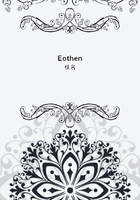
第31章
We spoke of the bending twig by which, it is said, precious metals may be discovered. In relation to this, the prophetess told me a story rather against herself, and inconsistent with the notion of her being perfect in her science; but I think that she mentioned the facts as having happened before the time at which she attained to the great spiritual authority which she now arrogated. She told me that vast treasures were known to exist in a situation which she mentioned, if I rightly remember, as being near Suez;that Napoleon, profanely brave, thrust his arm into the cave containing the coveted gold, and that instantly his flesh became palsied, but the youthful hero (for she said he was great in his generation) was not to be thus daunted; he fell back characteristically upon his brazen resources, and ordered up his artillery; but man could not strive with demons, and Napoleon was foiled. In after years came Ibrahim Pasha, with heavy guns, and wicked spells to boot, but the infernal guardians of the treasure were too strong for him.
It was after this that Lady Hester passed by the spot, and she described with animated gesture the force and energy with which the divining twig had suddenly leaped in her hands.
She ordered excavations, and no demons opposed her enterprise; the vast chest in which the treasure had been deposited was at length discovered, but lo and behold, it was full of pebbles! She said, however, that the times were approaching in which the hidden treasures of the earth would become available to those who had true knowledge.
Speaking of Ibrahim Pasha, Lady Hester said that he was a bold, bad man, and was possessed of some of those common and wicked magical arts upon which she looked down with so much contempt. She said, for instance, that Ibrahim's life was charmed against balls and steel, and that after a battle he loosened the folds of his shawl and shook out the bullets like dust.
It seems that the St. Simonians once made overtures to Lady Hester. She told me that the Pere Enfantin (the chief of the sect) had sent her a service of plate, but that she had declined to receive it. She delivered a prediction as to the probability of the St. Simonians finding the "mystic mother,"and this she did in a way which would amuse you.
Unfortunately I am not at liberty to mention this part of the woman's prophecies; why, I cannot tell, but so it is, that she bound me to eternal secrecy.
Lady Hester told me that since her residence at Djoun she had been attacked by a terrible illness, which rendered her for a long time perfectly helpless; all her attendants fled, and left her to perish. Whilst she lay thus alone, and quite unable to rise, robbers came and carried away her property. *She told me that they actually unroofed a great part of the building, and employed engines with pulleys, for the purpose of hoisting out such of her valuables as were too bulky to pass through doors. It would seem that before this catastrophe Lady Hester had been rich in the possession of Eastern luxuries; for she told me, that when the chiefs of the Ottoman force took refuge with her after the fall of Acre, they brought their wives also in great numbers. To all of these Lady Hester, as she said, presented magnificent dresses; but her generosity occasioned strife only instead of gratitude, for every woman who fancied her present less splendid than that of another with equal or less pretension, became absolutely furious: all these audacious guests had now been got rid of, but the Albanian soldiers, who had taken refuge with Lady Hester at the same time, still remained under her protection.
The proceedings thus described to me by Lady Hester as having taken place during her illness, were afterwards re-enacted at the time of her death. Since I wrote the words to which this note is appended, I received from Warburton an interesting account of the heroine's death, or rather the circumstances attending the discovery of the event; and Icaused it to be printed in the former editions of this work.
I must now give up the borrowed ornament, and omit my extract from my friend's letter, for the rightful owner has reprinted it in "The Crescent and the Cross." I know what a sacrifice I am making, for in noticing the first edition of this book reviewers turned aside from the text to the note, and remarked upon the interesting information which Warburton's letter contained. [This narrative is reproduced in an Appendix to the present edition.]
In truth, this half-ruined convent, guarded by the proud heart of an English gentlewoman, was the only spot throughout all Syria and Palestine in which the will of Mehemet Ali and his fierce lieutenant was not the law. More than once had the Pasha of Egypt commanded that Ibrahim should have the Albanians delivered up to him, but this white woman of the mountain (grown classical not by books, but by very pride)answered only with a disdainful invitation to "come and take them." Whether it was that Ibrahim was acted upon by any superstitious dread of interfering with the prophetess (a notion not at all incompatible with his character as an able Oriental commander), or that he feared the ridicule of putting himself in collision with a gentlewoman, he certainly never ventured to attack the sanctuary, and so long as the Chatham's granddaughter breathed a breath of life there was always this one hillock, and that too in the midst of a most populous district, which stood out, and kept its freedom.
Mehemet Ali used to say, I am told, that the Englishwoman had given him more trouble than all the insurgent people of Syria and Palestine.